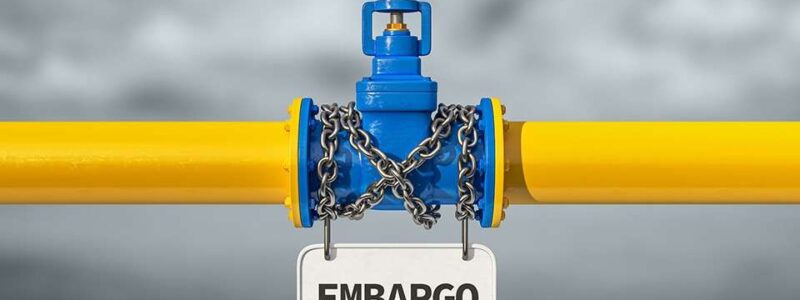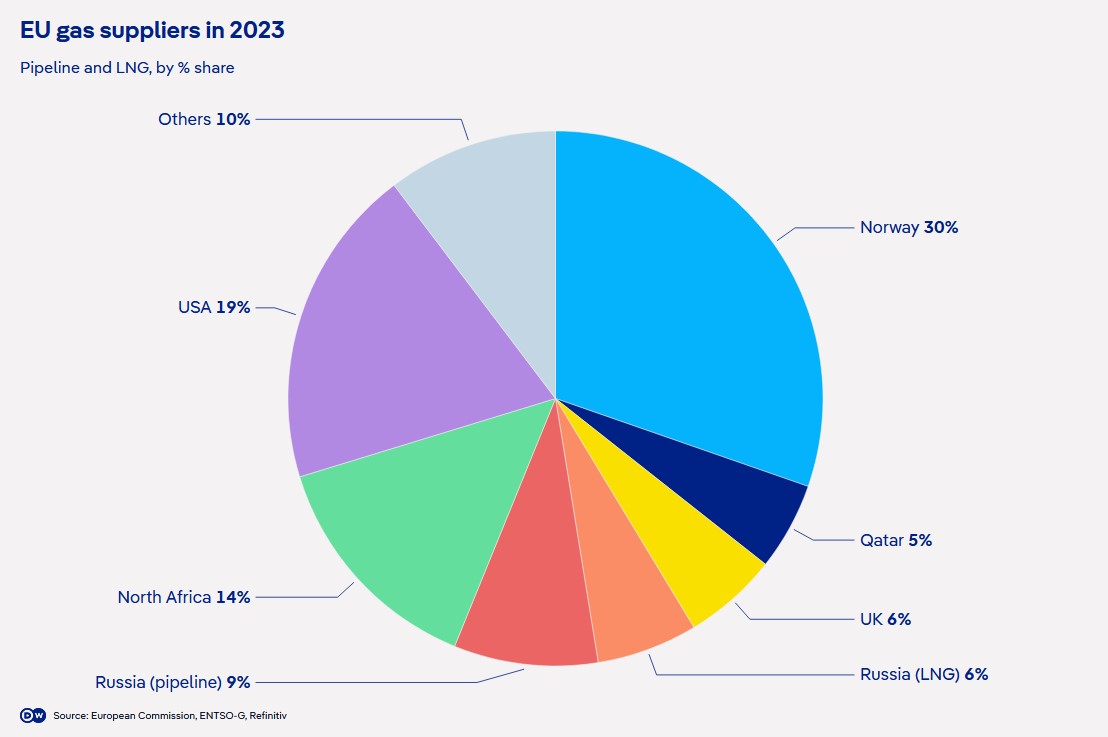
Despite the fact that the EU has sharply reduced the amount of Russian gas it imports, significant volumes are still flowing into the bloc. More than two years after Russia launched its full-scale invasion of Ukraine, its gas is still flowing into Europe.
Although the European Union has significantly reduced the amount of gas it imports from Russia, the hydrocarbon still powers some European homes and businesses, thus increasing the Kremlin’s revenues.
When the war broke out, European leaders were forced to reckon with their long-established dependence on both Russian gas and oil. Gas was a particular problem, as in 2021, 34% of EU gas came from Russia.
Central and Eastern European countries were particularly dependent. When the EU proposed a ban, German Chancellor Olaf Scholz was quick to speak out against it. “Europe has deliberately removed energy supplies from Russia from the sanctions. At the moment, Europe’s energy supply for heat production, transportation, electricity and industry cannot be ensured in any other way,” he said.
Vladimir Putin took advantage of this. Throughout 2022, Russia reduced gas imports to Europe. European leaders feared a winter energy shortage. These fears never materialized, but importantly, they meant that the EU never imposed sanctions on Russian gas.
“It was never a sanction,” says Benjamin Hilgenstock of the Kyiv School of Economics. “It was a voluntary decision of the countries, and a reasonable one, to diversify their supplies and no longer blackmail Russia,” he told DW.

According to EU data, the share of Russian pipeline gas imported by member states has decreased from 40% of the total in 2021 to about 8% in 2023. However, if liquefied natural gas (LNG) – natural gas cooled to a liquid state so that it can be transported by ship – is included, the total share of Russian gas in the EU’s total volume last year was 15%.
One of the main ways to reduce the EU’s dependence on Russian gas has been to increase imports of LNG from countries such as the United States and Qatar. However, this has unwittingly led to a sharp increase in the supply of Russian LNG at high prices to the bloc.
According to Kpler, Russia has become the second largest supplier of LNG to the EU. In 2023, LNG imports from Russia will account for 16% of total LNG supplies to the EU, which is 40% more than in 2021.
Import volumes in 2023 were slightly down on 2022, but data for the first quarter of 2024 show that Russian LNG exports to Europe were up again by 5% year-on-year. France, Spain, and Belgium were particularly large importers. These three countries accounted for 87% of the LNG that entered the EU in 2023.
However, most of this LNG is not needed by the European market and is transshipped in European ports and then re-exported to third countries around the world, resulting in profits for some EU states and companies.
Most of the Russian LNG that comes to Europe is simply “transshipped,” says Hilgenstock. “So it has nothing to do with the supply of natural gas to Europe. It’s just European companies making money by facilitating Russian LNG exports.”
According to a recent report by the Center for Research on Energy and Clean Air
(CREA), just under a quarter of Europe’s LNG imports from Russia (22%) will be transshipped to world markets in 2023. Petras Katinas, an energy analyst at CREA, told DW that most of this LNG was sold to Asian countries.
As a result, some EU members, such as Sweden, Finland and the Baltic states, are putting pressure on the bloc to impose a complete ban on Russian LNG, which would require the consent of all member states.
The EU is currently discussing a ban on re-exporting Russian LNG from European ports. According to the Bloomberg news agency, they are also considering imposing sanctions on key Russian LNG projects, such as Arctic LNG 2, the UST Luga LNG terminal, and the Murmansk plant.
“We really should basically ban Russian LNG,” said Hilgenstock. “We don’t think it plays any significant role in Europe’s gas supply, or that it can be replaced relatively easily with LNG from other sources.” A 2023 study by the Bruegel think tank confirms this analysis.
However, Acer, the EU’s energy regulator, recently warned that any reduction in Russian LNG imports should be done in “gradual steps” to avoid an energy shock.
EU countries continue to receive Russian gas
Pipeline gas from Russia also continues to flow to the EU. Although the Nord Stream pipelines are not working and the Yamal pipeline no longer carries Russian gas to Europe, it still arrives at the Austrian gas hub of Baumgarten via pipelines that pass through Ukraine. Austrian state-owned energy company OMV has signed a contract with Russian gas company Gazprom until 2040.
In February, Austria confirmed that 98% of its gas imports in December 2023 will come from Russia. The government says that it wants to terminate the contract with Gazprom as soon as possible, but for this to happen, EU sanctions against Russian gas must be legally imposed.
Like Austria, Hungary continues to import large quantities of piped Russian gas. Hungary has also recently signed a gas deal with Turkey, but experts say that this gas, which is supplied by the Turkstream pipeline, also comes from Russia.
Gilgenstock says that some countries continue to buy Russian gas because they benefit from cheap and attractive contracts. “So if there is no embargo on Russian gas, it all depends on these countries,” he says.
For countries such as Austria and Hungary, the possible suspension of pipeline imports from Russia may ultimately depend on Ukraine. Kyiv insists that it will not extend the existing agreement with Gazprom on gas supplies through its territory. This agreement expires at the end of 2024.
Although Russian gas is still imported into Europe, its overall share of European gas imports has fallen sharply since 2021. The EU says it wants to be completely free of Russian gas by 2027, a goal that Gilgenstock believes is looking increasingly realistic.
“I think that if this whole messy story has shown us anything, it’s that we can diversify our gas and other energy supplies relatively quickly by getting off Russia,” he said.
However, in his opinion, the political environment is “not very favorable” for a full gas embargo, especially for a pipeline embargo. He cites Hungary’s EU presidency in the second half of 2024 as a potential obstacle. Budapest has closer ties to Moscow than most EU member states.
As for LNG, he is more optimistic and says that, in addition to EU action, major LNG importers such as Spain and Belgium must take action themselves.
“This illegal import of Russian gas is a huge problem, especially in terms of messaging,” he said. “And we are helping Russia with its LNG supply chain, which we shouldn’t be doing.”